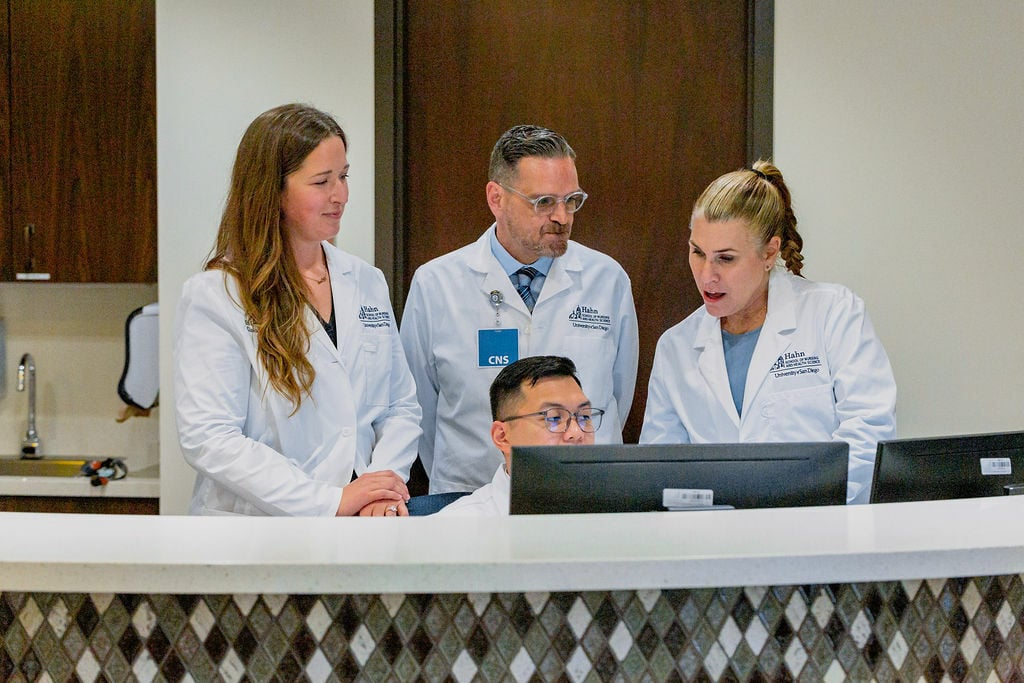
Discover the Benefits of a Nursing Degree From USD
The information in this blog post is for informational purposes only and is not intended to replace medical, financial, or professional advice.
Nurses exist as some of the most impactful and critical workers in the healthcare field. Nursing professionals are on the front line in hospitals, physicians’ offices, care facilities, clinics, schools and more — making them the primary providers of patient care in the workforce.
But nurses today are tired. They are navigating the ongoing negative impacts of the COVID-19 pandemic in addition to a national shortage of nurses and prolonged stress due to demanding work environments. For these reasons (and many more), nurses are experiencing burnout.
Nurses with chronic burnout are left feeling the heavy weight of “the cost of caring” — and run the risk of developing compassion fatigue.
So, what is compassion fatigue? Why is compassion in healthcare important? And how can you, as a nursing supervisor or other type of nurse leader, prevent compassion fatigue in your nursing staff?
Let’s talk about the critically important topic of compassion fatigue and explore ways in which you can help to combat it — and deliver better patient outcomes at the same time.
Explore our digital resource —
A Guide to Achieving the Master of Science in Nursing at USD
What is compassion fatigue in nursing?
Compassion fatigue is defined as “stress resulting from exposure to a traumatized individual.” It is a combination of stress and burnout that results in physical and mental exhaustion. This, in turn, inhibits one’s ability to provide the best possible care to others.
Compassion fatigue most commonly affects healthcare professionals that provide direct patient care — meaning that nurses are some of the most affected by compassion fatigue in the medical field.

Nurses suffering from compassion fatigue and burnout may find their empathy running thin and feel detached from their patients. Compassion fatigue in nursing also manifests in physical and emotional symptoms, such as:
- Feelings of hopelessness
- Decreased empathy
- Increased anxiety
- Lack of emotional awareness
- Reduced productivity
- Difficulty concentrating or making decisions
- Limited patience
- Self-isolation and withdrawal
- Nausea, headaches, and insomnia
Knowing the signs of compassion fatigue is the first step to prevention. Now, let’s explore why compassion in healthcare is important — and a few practical ways of preventing compassion fatigue on your nursing team.
Why is compassion important in nursing?
Compassion in nursing is critical — research shows that when nurses show empathy and kindness, their patients actually heal faster. In other words, patient care that is delivered with compassion can accelerate the healing process and result in better outcomes for both patients and nurses.
Studies have shown that delivering patient care with kindness and empathy actually “calms patients, lowers blood pressure, and enables faster recuperation, reduced pain, and shorter hospital stays.”
But nurses suffering from compassion fatigue have limited kindness and empathy to infuse into their delivery of care. How can nurses prevent burnout? And, if they do lose empathy, how can they go about getting compassion fatigue treatment? And finally, what are ways to prevent compassion fatigue in the first place?
How to prevent compassion fatigue in nursing
“We are witnessing a unique and complex occupational trauma that is affecting the global nursing workforce. Nurses are dealing with relentless, unprecedented demands from their patients, resulting in physical exhaustion. But they are also facing enormous mental health pressures leading to serious psychological distress.” — Howard Catton, International Council of Nurses, CEO
As a nurse supervisor or manager, you set the tone for your nursing team. You have the ability to improve the retention of your nursing staff and help prevent compassion fatigue, and here’s how.
Lead by fostering a culture of open communication
For nursing staff, your nurse leadership style is crucial to reducing and preventing compassion fatigue. Nursing leaders who oversee a team of nurses should cultivate and foster a culture that prioritizes leadership through open communication and active listening.
Nurses who feel like their concerns are validated are more likely to reach out for support, communicate when struggling, and navigate challenging situations more effectively. In other words, nurses who feel supported by their supervisors and fellow nurses are more likely to experience joy in their role and successfully navigate stressful situations that would otherwise result in compassion fatigue.
Practice emotional intelligence
Emotional intelligence is the ability to identify and understand emotions in oneself and others. Nurse supervisors have a significant impact on the retention of practicing nurses, which is why exercising emotional intelligence and developing the awareness to recognize symptoms of emotional exhaustion and burnout is critical.
Nursing leaders must be intuitive to the unspoken emotional toll that many nurses experience day-to-day and should use emotional intelligence to build trust and loyalty with nursing staff, both essential to securing and retaining exemplary nurses on your team.
Encourage self-care prioritization
Nurses are tasked with delivering patient care in high-stress environments — often, with hectic schedules and long hours. Nurses who experience ongoing stress are much more likely to experience compassion fatigue than those who do not.
When a member of your nursing team expresses a concern related to burnout or compassion fatigue, empathize with them, but most importantly, suggest practical solutions, such as adjusting their schedule to better accommodate work-life balance or even seeking a new nursing role that reduces the stress that comes with hands-on patient care.
When in doubt, encourage your nursing staff to prioritize self-care in whatever form resonates with them.
Nurture your own dedication to lifelong learning
You are already passionate about helping others through nursing. But if you want to serve the healthcare field as a nursing leader, then you need to obtain a graduate nursing degree that will equip you with the leadership, emotional intelligence, and advocacy skills needed to oversee a team of dynamic nurses.
As a future nursing leader, it is paramount that you choose a Master of Science in Nursing (MSN) program that is not only aligned with your future leadership goals but dedicated to your success as well — like an MSN from the University of San Diego.
Become the next indispensable nursing leader in San Diego — connect with us today.
The University of San Diego's Hahn School of Nursing and Health Science is a community of progressive scholars and practitioners in an intellectually rigorous environment where we prepare the next generation of nurse leaders and researchers to meet humanity's most urgent needs — with compassion and with intellectual rigor.
Our Master of Science in Nursing will take your passion for nursing and nurture it into a deeper expertise — making you a visionary leader in the field of healthcare.
Through our MSN program, we offer three tracks: Adult-Gerontology Clinical Nurse Specialist, Executive Nurse Leader, and Nursing Informatics. Each track will equip students with academic and professional excellence in their respective areas through creative teaching methods and hands-on learning opportunities.
Ready to take the next step in your nursing career? You’re in the right place. We encourage you to request more information about our graduate nursing programs or read more nursing stories.
You can also start your online application if you’re ready to jumpstart your next academic venture.
Check out our digital resource, Exploring Compassion Fatigue in Nurses to learn more about burnout and what you can do to prevent it.
The information provided by USD’s Hahn School of Nursing and Health Science is for informational purposes only and is not intended to replace professional medical or financial advice. This includes, but is not limited to, blog posts, eBooks, webinars, emails, graphics, social media posts, and other content. Always seek the guidance of your physician or a qualified medical or financial professional.
A Guide to the University of San Diego's Adult-Gerontology Clinical Nurse Specialist Program
The University of San Diego's nursing program ranks among the best in the nation. But that's not the only reason future students walk through our doors to pursue one of our graduate degrees. Download our guide for an in-depth look at the Adult-Gerontology Clinical Nurse Specialist program and learn how our rich heritage of excellence in nursing education can help you achieve your academic and professional goals.
GET THE GUIDE








